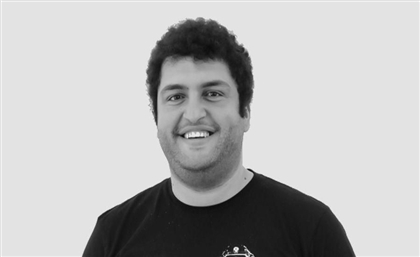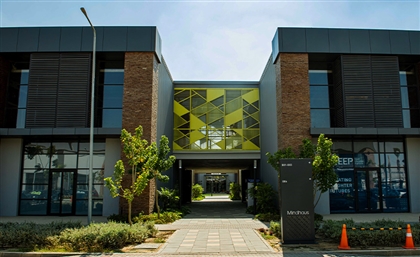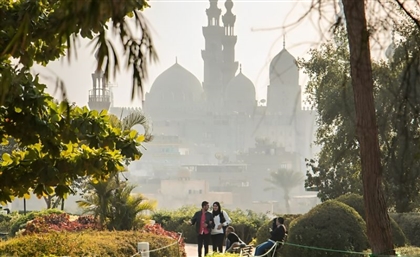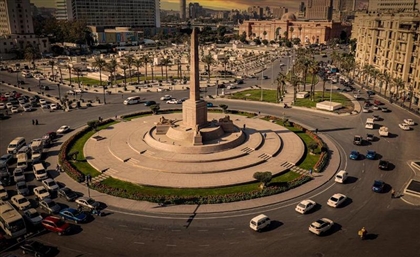Steve Haley: Start Me Up
When Steve Haley arrived in Cairo three years ago with Mercy Corps, he had one mission: to give a fighting chance to the myriad innovative start-ups that have struggled to gain a foothold in Egypt's budding entrepreneurial scene since the revolution.
It's a huge point of contention whether the revolution has actually brought about any tangible change in Egypt, and one that could be the source of endless controversy. But one trend has undeniably been apparent; away from the politics of it all, the last few years since the revolution have opened up a creative space for innovative young individuals to launch fledgling enterprises in a market that has long been engulfed by huge monopolies - something which spurred the inception of the Rise Up Summit.
And though the odds have, for the most part, been stacked against them, these young start-ups have continued to grow. No one knows this better than Steve Haley, the General Manager of MC Egypt LLC, a for-profit organisation owned by Mercy Corps, a non-profit global aid agency that focuses countries undergoing transition, who gave some awe-inspiring sessions at this year's Rise Up.
Having previously worked in Iraq, Lebanon and Libya - in many cases on providing aid in high-risk situations - Haley came to Egypt three years ago, right after the revolution, launching Mercy Corps' mission in Egypt. In the absence of immediate threats on peoples' lives, MC Egypt decided to focus on supporting start-ups in Egypt, and in particular on tech and agriculture-based start-ups, addressing what they saw as the pressing need to create jobs in the market.
We spoke to Haley on the sidelines of the Rise Up Summit about the importance of the role of start-ups in Egypt, and the ideology that influenced Mercy Corps' decision to focus on tech and agriculture start-ups specifically.
Tell us about yourself and your own background with Mercy Corps.
I've been working with Mercy Corps for about eight years now, all over the region. Mercy Corps does a wide variety of different types of initiatives in countries that are going through some type of transition. In Egypt, I've been here for three years and we work entirely and solely with IT-enabled and agriculture-related start-up companies, because we see those as two very important and growing markets.
Even if agriculture isn't growing, this is essentially an agricultural country, so we decided that that base will always remain. Nothing can ever change that. So it's important to help those kinds of companies grow. Especially innovative ones.
And then if you look at the changes that are happening with Egypt and the changes that are happening within markets, one of the main changes in a lot of markets, which have been relatively stagnant in Egypt for 20-30 years, is that everyone has a cell phone.
So those were our decisions to do that in Egypt.
We came in right after the revolution with the idea that there is a lot of opportunity here, and so if we can find the people who are building on those opportunities, like AbdulHameed and RiseUp, or Alfy and Ramez from Flat6Labs - those are the people who are really trying to make a change, and trying to do something positive for their country. Whatever we can do to support them, we're very happy to.
I would like to say also that here, we are MC Egypt, which is a for-profit company that just happens to be owned by Mercy Corps, a non-profit organisation. But the intent is that we are a part of the private sector, and not a part of civil society.
Speaking in terms of agriculture, what kind of experience has it been? Is it still a profitable market?
In the end, people have to eat. If we break it down to business; people buying things and people selling them, and people will always have to buy food. Now, how the markets are structured is challenging, but in the end, no matter what happens, people will always have to buy food. It's difficult to see a lot of wasted resources in that market, but that's where I think some of the new innovative companies working in organic farming or in hydroponics or rooftop farming - to me I think those are the interesting ones.
What I would say is interesting in terms of agriculture and agriculture-related business is that there's a new trend in Egypt, which is about high-quality locally grown food. The more that grows and the more there's a demand for high-quality locally grown food, then those markets will start to develop and we'll start seeing improvements in the cold chain, and in the storage and packing. And those are the improvements that have to happen in the market. I would love to see a start-up come to us with a new innovative packing company that's going to revolutionise the way Egyptian food is handled post-harvest. That would be awesome. Unfortunately, we don't see a lot of innovation in that space.
Why do you think that is? Do you think the government has a role in it? Does MC Egypt work with the government at all?
No. It's a private sector company and it's the private sector's responsibility to do that. Everything that's happening in this space is coming out of investors like Cairo Angels, Flat6Labs, Sawari Ventures and Ahmed Alfy. The private sector is doing this, and I think once we see the private sector getting more engaged in pushing for more innovative agriculture solutions, then it will happen.
We don't deal with the government, we deal with businesses, and finding businesses that are working in that space. I think it's definitely something that's grown. We've had a couple of agriculture-related companies, and growth in Flat6Labs, I think that's a sign that it's up and coming in the next couple of years.
What kinds of challenges do you face?
It's just a shame that it costs so much money and time to go through the legal barriers of getting set up. That's definitely one. The other major issue that all of us face is the lack of access to information. Market information is very difficult to find. Statistics are very difficult to find. That would be very helpful.
Tell us more about the work you were doing before you came to Egypt.
I've worked in Iraq, Lebanon and Libya, prior to this. In each place there are different challenges that communities and young change-makers are facing, and so it's our responsibility to conform to whatever the support they need is. I think that's the line that connects everything. These are all high-risk situations, but being in the middle of a war-zone is a different kind of risk than we have here in Egypt. Here, it's a risk that these start-ups are going to fail, and so it's a matter of being comfortable with those types of risks, and how to understand those risks.
In genera, what I've always had to do is manage different groups and teams working around risk and working around trying to have a vision for change, whether I do that in Iraq, or Lebanon, or here.
In Iraq we had a very wide range of programs, from distributing things to refugees, to setting up internet centers.
In Lebanon we also did a lot of computer training, and one of my favourite things that I did in Lebanon is set up a co-working space called AltCity, and the CEO of AltCity was representing here at RiseUp about co-working. It's a self-sustaining, amazing co-working space in Beirut, which we were instrumental in setting up while I was in Lebanon.
Libya was us just worrying that people affected by the conflict had the things they needed to survive, which is another aspect of what Mercy Corps does.
What goes into deciding which projects you're gonna work on? Why did you choose working on start-ups in Egypt as your main point of attack?
Mercy Corps is a completely decentralised organisation. The decision is completely made by the local country management. In Egypt, particularly because one of the things that everyone can agree on that Egypt needs is jobs. You can make all kinds of debates around what kinds of government structures, or civil society or laws, who should the government be, etc. Fine, but that's not my or Mercy Corps' business to decide. That's Egypt's business to decide.
However, everybody agrees that jobs are needed, and everybody agrees that the private sector needs to create jobs. Enabling the private sector to create the right types of jobs is incredibly important. And people would say 'if you want to create jobs, build a factory.' But you're not going to create jobs for college graduates; for highly intelligent, ambitious, young Egyptians.
There's a huge number of unemployed, highly educated, intelligent, capable, ambitious Egyptians, and no one's creating jobs for them, especially these start-ups. I think the most efficient way to create jobs is for that particular market. As well as the fact that with everything that's happening in this country over the past couple of years, start-ups have continued to grow. Throughout all the demonstrations and all of the problems, start-ups were going to work, getting stuff done, growing and overcoming obstacles. Those are the kinds of people that should be supported.
As well as the fact that it's apolitical, and we're very much an apolitical organisation.
In terms of legislation in Egypt, lots of people talk about how there are so many obstacles to get through. What's your assessment of the situation?
For sure, there's all kind of obstacles to get through, and I think it would be amazing if all the strong private sector actors in this ecosystem were to come together to advocate for change. It's not our role to advocate for different legislation. It is challenging and we really do hope that the government decides to take action on it, because it could grow more, better companies, and create better jobs, create an enabling environment, and get more tax revenue. So, we think it's in their interests, but, think what you want of them, the government has a lot on their plate right now.
- Previous Article Egypt to Cook World's Biggest Koshary for Guinness Record!
- Next Article Nomades Land
Trending This Week
-
Apr 10, 2024
























